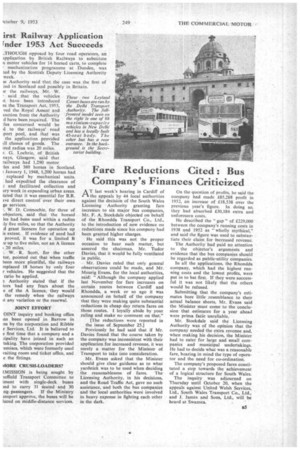Fare Reductions Cited : Bus Company's Finances Criticized
Page 39

If you've noticed an error in this article please click here to report it so we can fix it.
AT last week's hearing in Cardiff of the appeals by 44 local authorities against the decision of the South Wales Licensing Authority granting fare increases to six major bus companies, Mr. F. A. Stockdale objected on behalf of the Rhondda Transport Co., Ltd., to the introduction of new evidence on reductions made since his company had been granted higher charges.
He said this was not the proper occasion to hear such matter, but assured the chairman, Mr. Tudor Davies, that it would be fully ventilated in public.
Mr. Davies ruled that only general observations could be made, and Mr. Meurig Evans, for the local authorities, said: "Although the company applied last November for fare increases on certain routes between Cardiff and Rhondda, a week or so ago it was announced on behalf of the company that they were making quite substantial reductions in cheap day return fares on those routes. 1 loyally abide by your ruling and make no comment on that."
[The reductions were reported in the issue of September 25.3 Previously he had said that if Mr. Davies found that the course taken by the company was inconsistent with their application for increased revenue, it was surely a matter for the Minister of Transport to take into consideration.
Mr. Evans asked that the Minister should give clear guidance as to what yardstick was to be used when deciding the reasonableness of fares. The Licensing Authority, in his decisions, and the Road Traffic Act, gave no such assistance, and both the bus companies and the local authorities were involved in heavy expense in fighting each other in the dark. On the question of profits, he said the company had made £85,288 profit in 1952, an increase of £18,538 over the previous year's figure. In doing so, they had absorbed 430,184 extra and unforeseen costs.
He described the " gap " of £229,000 between the company's running costs in 1938 and 1952 as "wholly mythical," and said the figure was used to substantiate their claim for increased revenue.
The Authority had paid no attention to the objector's arguments and evidence that the bus companies should be regarded as public-utility companies.
in all the applications, the Rhondda company, which had the highest running costs and the lowest profits, were put in to bat first. If they were successful it was not likely that the others would be refused.
Submitting that the company's estimates bore little resemblance to their actual balance sheets, Mr. Evans said the Minister must come to the conclusion that estimates for a year ahead were prima facie unreliable.
Mr. Stockdale said the Licensing Authority was of the opinion that the company needed the extra revenue and, when making his decision, the Minister had to cater for large and small companies and municipal undertakings. He had to decide what was a reasonable fare, bearing in mind the type of operator and the need for co-ordination.
The company's proposed fares constituted a step towards the achievement of a logical structure for South Wales.
The inquiry was adjourned on Thursday until October 20, when the appeals against United Welsh Services, Ltd., South Wales Transport Co., Ltd., and J. James and Sons, Ltd., will be heard at Swansea.




























































































